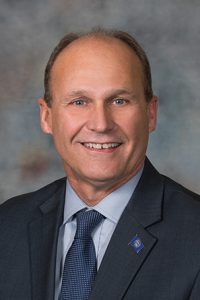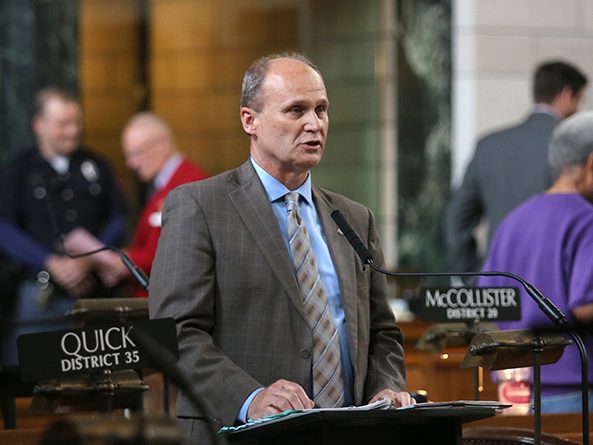Cloture attempt on land bank bill fails
A bill that would allow municipalities throughout Nebraska to create or join land banks did not advance from general file May 9 after a motion to end debate failed.

LB424, as introduced by Grand Island Sen. Dan Quick, would allow any municipality in Nebraska to join an existing land bank—a tax-exempt political subdivision that acquires, manages and develops vacant and tax-delinquent properties—under the Nebraska Municipal Land Bank Act. Currently, only municipalities in Douglas and Sarpy counties are eligible under state law to create land banks.
The bill also would specify that a land bank is prohibited from levying property taxes.
Under LB424, only a metropolitan class city could create a stand-alone land bank. Currently, Omaha is the state’s only metropolitan class city. Other municipalities wishing to create a land bank would be required to join together using the state’s Interlocal Cooperation Act.
A pending Urban Affairs Committee amendment would allow cities of the primary class to form their own land banks. Lincoln currently is the only primary class city in Nebraska.
Quick said there are around 200 blighted properties in Grand Island that are too costly and time consuming for private investors to rehabilitate. Those properties not only are eyesores, he said, but the city must pay to mow lawns and provide police and fire protection for the buildings.
“Those are taxpayer dollars that are going into those structures,” Quick said. “The cost is becoming too high.”
Sen. Matt Williams of Gothenburg said he supported LB424 because land banks could increase the amount of workforce housing in Nebraska.
“If the private sector was stepping up and taking care of this we wouldn’t have this problem,” Williams said.
Also in support was Gering Sen. John Stinner. He said a number of officials he’d spoken with in his district want to use land banks to address blighted properties in their towns.
“Rural Nebraska needs this bill more than Omaha,” Stinner said. “This legislation has been developed over years. It’s been tested.”
Sen. Mike Hilgers of Lincoln opposed the bill, saying he feared a land bank could compete unfairly with private developers and allow board members to profit from land sales.
“[The Land Bank Act] provides an absolute smorgasbord of powers to the land bank,” Hilgers said. “Ultimately, this Legislature has given a land bank so much power and it is reliant only on the good faith and goodwill and benevolence of those running the land bank.”
Also in opposition was Kearney Sen. John Lowe. He said a land bank represents government overreach.
“I don’t believe it is the government’s position to own property or develop property,” Lowe said. “Property should be developed by private citizens.”
After three hours of debate, Quick offered a motion to invoke cloture, which would end debate and force a vote on the bill and any pending amendments.
The cloture motion failed 31-10. Thirty-three votes were needed. A failed cloture motion results in debate on a proposal ceasing for the day. LB424 is unlikely to be placed on the agenda again this session.


